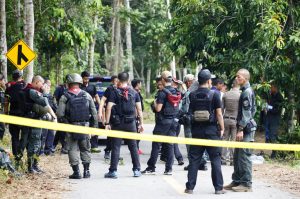Nearly two years since the announcement that the Thai government and the Barisan Revolusi Nasional (BRN) were beginning negotiations, the chances for peace in Thailand’s Deep South remain low. Granted, conflict resolution often necessitates protracted engagements in order to bear fruit. Yet progress can only be made in such an insurgency if the involved parties grant significant concessions to the other. This is an unlikely scenario at the current juncture.
The BRN is a Malay-Muslim separatist organization that claims to represent this minority group in Buddhist-majority Thailand. It is one of the several separatist organizations that have called for independence, something which Bangkok has never and will never consider accepting. The root of the conflict goes back to 1909, when a deal between the erstwhile Kingdom of Siam and Great Britain created the present-day border between Thailand and Malaysia. This division left the local Malay community, whose culture and history in the region go back centuries, separated by the border. Groups like BRN have enjoyed strong levels of local support in parts of the Deep South because of Bangkok’s apparent repression of the minority community. Allegations of human rights violations including torture and extrajudicial killings have been widespread. In 2019, for instance, a suspected insurgent fell into a coma after being interrogated, and subsequently died.
From 2001, violence escalated between separatists and Thai forces, and peaked in 2007. Between January 2004 and October 2021, more than 7,294 people have been killed, while 13,550 people have been injured, in 21,235 security incidents in the Deep South. There has been a general decrease in the number of incidents and casualties (counting deaths and injuries) in violence since 2007. However, according to data compiled by Deep South Watch, the talks since last January have not resulted in a drop in violence. In 2020, 27.9 incidents and 23.1 casualties occurred per month on average. In 2021, this increased to 38.8 incidents and 36.7 casualties, as of October. There was a brief decrease in incidents and casualties in 2020, however that did not last long. That lull is likely due to the COVID-19 pandemic, during which the BRN announced a short-lived ceasefire. BRN operatives recently sought to disrupt the November 2021 local elections in the Deep South with attacks.
The BRN organizational structure shows why Bangkok is facing such challenges in dealing with it, and why successful peace talks do not necessarily mean a reduction in violence. The group is highly decentralized, and its ruling council for the most part runs it from off stage. There are various factions and subgroups, such as the violent Runda Kumpulan Kecil, with different links to each other, and one does not necessarily speak for the other. BRN cells are highly localized. Some BRN elements apparently considered breaking off after learning that BRN’s leadership had engaged in secret talks with Thai authorities in 2019. So, the question remains, can the BRN leaders that Bangkok is in discussions with speak for the estimated 8,000-9,000 fighters on the ground, who themselves are not necessarily united?
This also leads to another long-term potential concern for Bangkok and the wider Southeast Asian region. At its core, the conflict is motivated by the ethnic identity and differences between Malay Muslims and Thai Buddhists. The global Islamist narrative espoused by transnational terrorist organizations has interestingly not gained much traction in this conflict, unlike those in other places. However, its roots are forming and spreading, and there are historical links between some Thai separatists and Southeast Asian terror organizations and Afghanistan.
Recently, there have been some indications that some Thai separatists are choosing to adopt this global Islamist narrative. Some insurgents in Pattani recently allegedly pledged allegiance to the Islamic State (IS). The IS East Asia (ISEA) province affiliates also released a video recently, titled “Messages of the Mujahideen to Thailand.” The fighters, likely based in the southern Philippines due to their language and equipment, called on Thai militants to continue their fight against the military.
Thailand’s Deep South insurgency has not received as much attention from global terror groups as, for instance, the conflict in Kashmir. But this could change with time, and as younger separatists fall under the influence of global jihadist narratives. The current dynamics, including the continuation of rights violations, and increased Deep South mistrust of Bangkok over the alleged mishandling of the COVID-19 pandemic, could create an environment in which these narratives become increasingly appealing. If the conflict does take this turn, Bangkok may be forced to adopt an even heavier-handed approach, such as under the leadership of Prime Minister Thaksin Shinawatra (2001-06). This will create a cycle of narratives and counter-narratives which could increase polarization and, hence, violence.
As it stands, neither the separatists nor Bangkok have much to gain from an escalation of violence. However, the involved parties seem unwilling to compromise, and may push each other to more extreme positions. Various internal and external factors can influence and affect these dynamics. In order for this seeming stalemate to end, something radical has to change on either, if not both, sides.

































